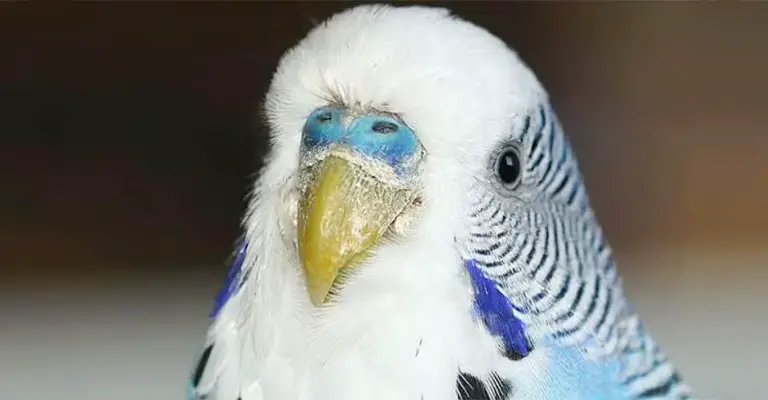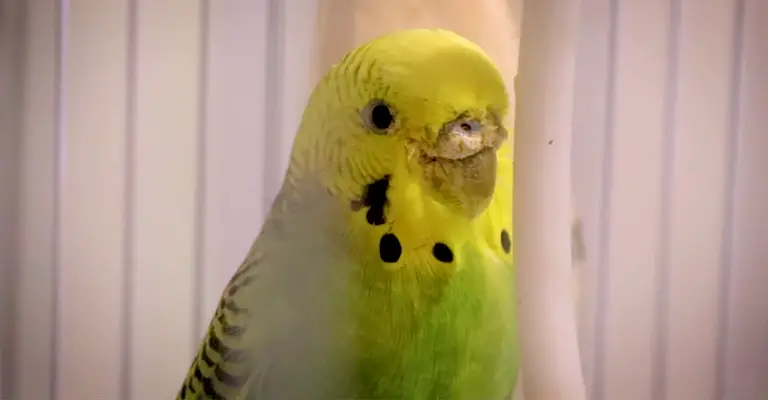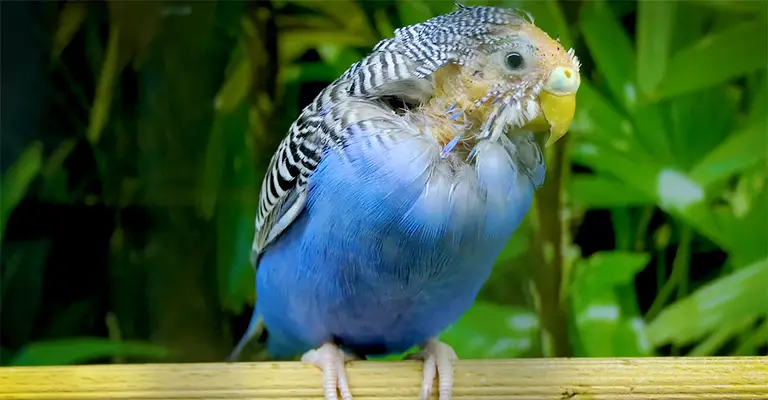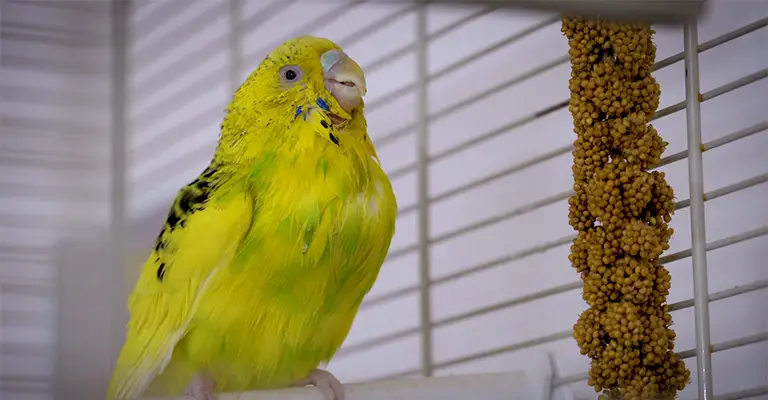In the delicate dance of caring for a pet budgie, addressing health issues can present unique challenges, especially when dealing with an untamed bird.
When faced with the task of treating a scaly face on an untamed budgie, the endeavor requires a balance of expertise, patience, and understanding.
This situation unfolds a journey where the intersection of avian health and the nuances of establishing trust come to the forefront.
Navigating how I treat a scaly face on an untamed budgie involves carefully tailored approaches that respect the bird’s boundaries while addressing its well-being.

How Do I Treat A Scaly Face On An Untamed Budgie?
Treating a scaly face on an untamed budgie requires patience and a gentle approach.
Here are some important tips to consider:
Isolation
If you have other budgies, isolate the affected bird to prevent the potential spread of the condition.
Consult an Avian Vet
Seek professional advice from an Avian veterinarian for an accurate diagnosis and treatment plan tailored to your budgie’s needs.
Topical Treatment
Your vet might recommend a topical treatment, such as a medicated cream or oil, to apply to the scaly areas. Approach the budgie calmly and carefully during application.
Softening Scabs
Soaking the scaly areas in warm water can help soften scabs before gently removing them. Use a clean, soft cloth or cotton pad for this process.
Nutritional Evaluation
Ensure your budgie’s diet is well-balanced and includes essential nutrients. A proper diet can boost its immune system and aid in the healing process.
Hygiene and Cage Cleaning
Maintain a clean environment to prevent the condition from worsening. Regularly clean the cage, perches, and toys.
Stress Reduction

Provide a calm and quiet space for your budgie to reduce stress. Stress can worsen the condition, so minimize loud noises and sudden movements.
Slow Socialization
If your budgie is untamed, avoid sudden movements that could cause stress. Gradually introduce your presence near the cage to build trust over time.
Patience and Consistency
Treating an untamed budgie requires patience. Approach slowly, offer treats, and use positive reinforcement to build a bond and gain its trust during treatment.
Remember, an untamed budgie might be fearful of human interaction. Proceed gently, respecting its boundaries and taking gradual steps to ensure successful treatment.
Regular vet check-ups and a caring, patient approach are key to helping your budgie recover from scaly face mites or other skin conditions.
What Causes A Scaly Face On An Untamed Budgie?

A scaly face is a condition caused by a parasitic mite called Knemidocoptes pilae, which burrows into the skin and feathers around the beak, eyes, legs, and vent of budgies.
It can cause thickening, scaling, crusting, or deformity of the affected areas and can lead to secondary infections or complications.
Here are some possible causes of the scaly face of an untamed budgie:
Exposure To Infected Birds Or Objects
The most common cause of scaly faces is exposure to infected birds or objects that carry the mites. The mites can be transmitted by direct contact or by sharing food, water, toys, perches, or cages with infected birds.
Untamed budgies may be more prone to scaly faces if they come from pet shops, breeders, or rescues that have poor hygiene or quarantine practices.
Weak Immune System Or Poor Health
Another cause of a scaly face is a weak immune system or poor health that makes the budgie more susceptible to the mites.
‘The immune system or health of the budgie may be compromised by factors such as stress, malnutrition, dehydration, illness, injury, or old age.
Untamed budgies may have a weak immune system or poor health if they are not well cared for or have a history of abuse or neglect.
Lack Of Grooming Or Preening
Another cause of scaly faces is a lack of grooming or preening that allows the mites to multiply and spread on the skin and feathers.
Grooming or preening is a natural behavior that helps the budgie keep its skin and feathers clean and healthy.
Untamed budgies may lack grooming or preening if they are not comfortable or confident in their environment or with their owner.
Lack Of Sunlight Or Vitamin D
Another cause of a scaly face is a lack of sunlight or vitamin D which affects the growth and maintenance of the skin and feathers.
Sunlight or vitamin D is essential for the budgie to produce keratin, which is a protein that forms the structure of the skin and feathers.
Untamed budgies may lack sunlight or vitamin D if they are kept indoors or in dark or shaded areas for long periods of time.
Lack Of Humidity Or Moisture
Another cause of a scaly face is a lack of humidity or moisture that causes dryness or irritation of the skin and feathers.
Humidity or moisture is important for the budgie to keep its skin and feathers soft and flexible. Untamed budgies may lack humidity or moisture if they are kept in dry or arid climates or in air-conditioned or heated rooms for long periods of time.
Lack Of Calcium Or Phosphorus
Another cause of a scaly face is a lack of calcium or phosphorus, which affects the formation and strength of the beak and nails.
Calcium and phosphorus are minerals that are essential for the budgie to build and repair its beak and nails. Untamed budgies may lack calcium or phosphorus if they are fed a poor diet that does not contain enough seeds, pellets, fruits, vegetables, or supplements.
Genetic Predisposition Or Mutation
Another cause of scaly faces is a genetic predisposition or mutation that makes the budgie more vulnerable to the mites.
Genetic predisposition or mutation is a trait that is inherited from the parents or ancestors of the budgie and can affect its physical characteristics or immune response.
Untamed budgies may have a genetic predisposition or mutation if they are inbred, hybridized, or mutated by artificial means.
Environmental Factors Or Changes
Another cause of scaly faces is environmental factors or changes that stress or disturb the budgie. Environmental factors or changes can include noise, temperature, humidity, lighting, pollution, or seasonality.
Untamed budgies may be affected by environmental factors or changes if they are exposed to sudden or extreme variations in their surroundings or routine.
Psychological Factors Or Issues
Another cause of a scaly face is psychological factors or issues that affect the mood or behavior of the budgie.
Psychological factors or issues can include fear, anxiety, depression, loneliness, boredom, or frustration.
Untamed budgies may suffer from psychological factors or issues if they are not well-socialized or stimulated by their owner or other birds.
What Are The Consequences Of A Scaly Face On An Untamed Budgie?

Scaly face is a serious condition that can have many negative consequences for an untamed budgie. Here are some of the possible consequences that a scaly face can cause:
Physical Discomfort:
Scaly face mites, such as the Knemidocoptes mite, can cause intense itching and discomfort. An untamed budgie’s inability to seek relief through preening or scratching might exacerbate this discomfort.
Impaired Vision:
If scaly face mites affect the area around the eyes, it can lead to swelling, crusting, and even the closing of the eyes. This can impair the budgie’s vision and overall quality of life.
Feeding Difficulties:
Scaly face mites can cause scabs and crusts around the beak and cere, making it painful for the budgie to eat. Feeding difficulties can lead to malnutrition and weight loss.
Infections:
Open sores and lesions resulting from scratching at scaly areas can create entry points for bacterial infections. These infections can spread and cause more serious health issues.
Decreased Grooming:
Budgies naturally groom themselves, but scaly face mites can inhibit this behavior. A budgie that is unable to groom properly might develop poor feather condition and hygiene.
Stress and Anxiety:
Untamed budgies can experience heightened stress and anxiety when confronted with treatments or handling. The discomfort caused by scaly face mites combined with unfamiliar human contact can lead to increased stress levels.
Social Isolation:
In a flock or aviary, other budgies might sense the afflicted bird’s discomfort and avoid close interactions. This social isolation can impact the untamed budgie’s mental and emotional well-being.
Addressing a scaly face condition promptly is crucial to prevent these consequences.
Seeking veterinary care, employing appropriate treatments, and providing a supportive environment are essential steps to alleviate the negative effects of scaly face mites on an untamed budgie’s health and overall quality of life.
FAQ
Treating an untamed budgie requires a patient approach. Consult an avian vet for diagnosis and treatment recommendations.
Topical treatments, softening scabs with warm water, providing a proper diet, maintaining cleanliness, and reducing stress are key steps.
It’s best to consult a vet before using any treatments. Over-the-counter options might not be suitable for your budgie’s specific condition and could potentially worsen the issue.
Untamed budgies can find treatments stressful. Gradual socialization, offering treats, and being patient during treatments can help build trust over time.
Improvement varies based on the severity of the condition and the budgie’s response to treatment. It’s important to follow the vet’s instructions and monitor progress closely.
Regular cage cleaning, maintaining a balanced diet, and minimizing stressors can help prevent a scaly face. Regular veterinary check-ups are essential to catch any potential issues early.
Conclusion
The quest to treat a scaly face on an untamed budgie encapsulates the essence of compassionate pet ownership.
As we conclude this exploration, we recognize that this journey demands both avian veterinary guidance and the cultivation of a gentle, patient rapport.
In this pursuit, we not only mend a physical ailment but also embark on a path of building trust and fostering a bond that transcends fear.
As the scaly face condition heals, the intricate tapestry of empathy, respect, and healing continues to weave its threads, reminding us that the path to recovery is a testament to the resilience of nature and the power of nurturing care.